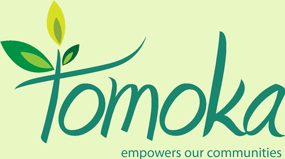
PROGRESS
TOGOLESE PROVERB (of the Ewe People):
Yatsie fia xomonu defe ame -- The rainstorm indicates the position of the door of a house
In other words, adapt your actions to circumstances and remember that new times call for new answers
THANK YOU FOR YOUR INTEREST IN OUR WORK!
CONTENTS
- Introduction
- Progress 1: construction & functioning of our organizations
- Progress 2: agricultural projects
- Progress 3: social / community development
- Progress 4: environmental awareness and rehabilitation
- Progress 5: agro-industry
Introduction
Tomoka’s Temporary Project Team and its Project Steering Group (CVD-P) have been working on the design, planning and practical preparation of this Project from October 2009 onwards. At the moment of writing (August 2010), we are preparing our Promotion and Fund Raising Campaign in order to get this Sustainable Rural Development Project fully operational.
At an early stage, we have decided not to prepare on paper only. Elsewhere, we explain that a preliminary start was deemed to be more effective and necessary. All concrete achievements, like the creation of a Pilot Plantation, a Jatropha Propagation Bank, and the formation of an effective Project Organization are mentioned there. The pre-financing of all this has been made possible by GuKam – a small company who joined the Community of the Canton of Dawlotu Tutu with the intention to start “Food & Bio-Energy” production as a motor of all further social-economic development.
Details of our plans, preparations and organisation have been explained on the webpage Our Project. In order to make clear why we doing certain things, it is important to keep in mind that Tomoka’s four Action / Intervention Programmes are interrelated in such ways that they form a combined contribution to the realization of three interacting national development goals . In terms of the UN Millennium Development Goals (MDG) Programme, they intend to ‘Eradicate extreme poverty and hunger (MDG 1)’, to ‘Promote gender equality and empower women (MDG 3)’, and to ‘Ensure environmental sustainability (MDG 7)’.
While we are trying to obtain sufficient funding and expertise for the whole Project, we would like to continue meanwhile our way of mobilising and organizing our extremely poor population by practical, low cost initiatives for which we ask your attention on the webpage Get Involved. The Mini Projects presented there, are examples of how Tomoka enables the population of the canton to follow the advice of the Proverb on top of this page: we help them to “adapt their actions to new circumstances and show them how they can make a change for the better”.
We will report our problems, solutions and achievements on a regular, bi-monthly basis. But don’t worry, they will be short. The first ones will appear on this website from 1 December 2010 onwards.
 |
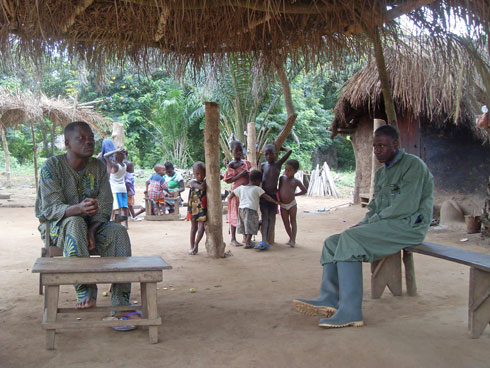 |
|||
Formal Public Meeting of the Project Steering Committee CVD-P; this time chaired by the Canton’s chief Togbui Akuagbi III. |
Frequent Informal Meetings between Chief Dzéto of Kpékpéta (the Zone in which Tomoka is situated) and GuKam facilitate mutual understanding. |
|||
Progress 1: construction & functioning of our organizations
For the time being, we refer you to two sections on this website. Please, start first reading about the Temporary Project Team which GuKam has made available. It will be of great help to hire the services of a Community Development worker at this stage already. Such a person is able to support and reinforce the multitude of organisational processes which are needed to mobilize the population towards more self-help and economic progress. That is why we have provided more details about the functioning of a community worker in a low budget mini project with the title A Head Start Mini Project.
Progress 2: agricultural projects
The crucial importance of starting up a Pilot Project for the combined production of Food & Bio-Energy (Jatropha) is explained in a document with the title “Design & Construction of the Pilot Plantation Tso Mia Wo Deka” (12-02-2010; document 30.20.233/C). You will find it posted on the webpage “Downloads” from 1 December onwards.
We will use the same briefing method regarding the Manuals which have been worked out and which are already being used for Collecting & Testing of high yielding Jatropha propagation material.
The Agricultural Scenario which lies at the basis of most social and agro-industrial programmes will be presented there as well.
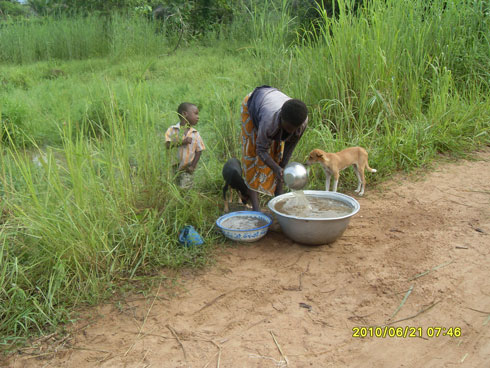 |
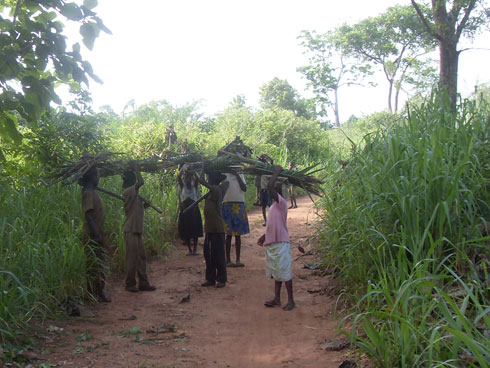 |
|||
BASE LINE – Fetching drinking water from pools and puddles ... |
BASE LINE – Cutting and collecting wood for energy is the norm for 80% of the Canton population. The other 20% can afford charcoal... |
|||
Progress 3: social / community development
For the time being, we refer you first to the intervention programmes which are explained elsewhere on this website. Moreover, we kindly ask you to consider supporting us with the Mini Projects which we have included in a special section with initiatives which improve the quality of life in our Canton instantaneously. They range from drinking water, basic teaching aids, and organizing women groups, to gathering the people around a new football field where they will meet also with Tomoka’s ideas about how to improve their own life situation. You may read more about our low budget proposals in Involvement Category 2.
Progress 4: environmental awareness and rehabilitation
The introduction of the hybrid variation of the Jatropha System which has been adopted by Tomoka lies at the basis of all interventions. You may read more about it on our webpage about the Jatropha System. Several details of our Project’s contributions to CO2 absorption, replanting of trees and replacing wood cutting and charcoal production by affordable Jatropha carburant have been dealt with already in some documents which will be posted in the download section of this website from 1 December 2010 onwards.
A Mini Project which prepares conservation and sustainable management of the natural environment in our Canton, is called "Let’s identify and protect our natural treasures". Your support of it is most welcome!
Progress 5: agro-industry
An essential characteristic of our project is the fact that different types of small scale agro-industrial activities will create important surplus values with the locally produced harvests. Jatropha seeds will provide the sustainable rural energy for cooking, light and fuel for (diesel) engines. Moreover, the Jatropha Oil will be the major ingredient for the local production of excellent bio-degradable soaps which do not pollute the environment. And staple food crops like maize, beans, soy and other crops will be the raw materials for the local production of baby-food and other easy-to-prepare food stuffs.
The women in our Canton will be in charge of most elements of the agro-industrial production and distribution programme. This is one of the ways by which Tomoka is contributing to the national programme on women empowerment.
The preparation document for production of rural, urban and export oriented soaps is titled “SAVOLAB: organisation & construction of Tomoka’s Experimental Laboratory for the development of natural, handmade soaps based on Jatropha oil”(GuKam Manual 7, 14-07-2010; document 30.20.570). It will be posted on this website from 1 December 2010 onwards, and other documents which prepare implementations, will follow.
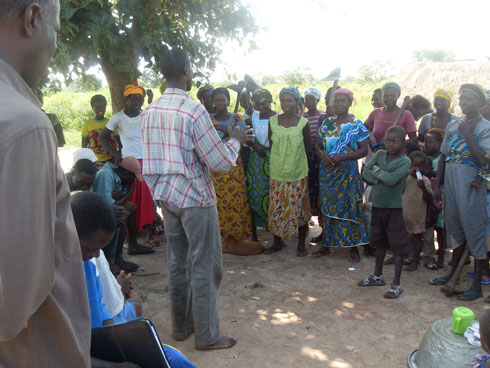 |
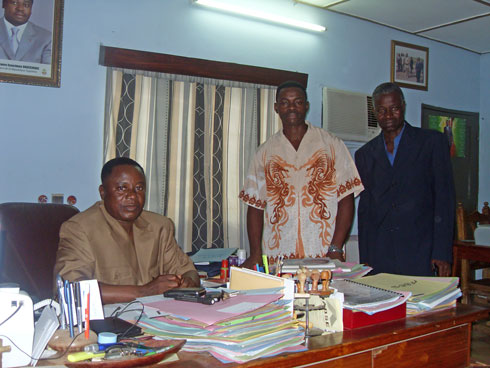 |
|||
BASELINE: TASK INSTRUCTIONS FOR WOMEN GROUPS are mostly handed out by male Village Headmen. This will change: more women autonomy is one of Tomoka’s objectives. |
COOPERATING WITH NATIONAL PROGRAMMES will be facilitated with the support of the Government’s local Highest Representative, the Préfet of the Préfecture d’Agou. |
|||
 Français
Français